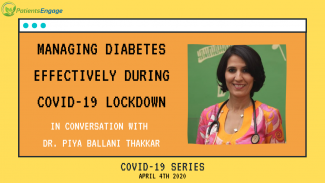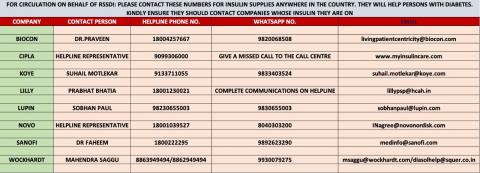
A webinar with Dr. Piya Ballani Thakkar, consultant endocrinologist and diabetelogist was held on 3rd April 2020 for all patients who are living with Diabetes. It address several questions on what people with this condition can and should do during the Covid-19 pandemic and lockdown period. Click on the video link below to listen to the entire webinar.
How is COVID different from other viruses?
We know that this is a respiratory virus which has a high transmission rate i.e. it travels faster from person to person compared to SARS and Influenza. The overall mortality from the virus is high worldwide. Lastly, the treacherous part is it is a very stealthy virus and transmits through asymptomatic carriers. That is the most dangerous part about this virus. The issue with Diabetes is not that people with Diabetes will get it more but that their symptoms may be more severe, infection could be more extreme and hence outcome could be much worse.
What should Diabetic patients do to prevent COVID infection?
- Check your sugar, stay in control
- Eat healthy
- Exercise well
- Take your medications regularly
- Stay in touch with your doctor
Should patients test at home or go to the lab for testing of blood glucose levels?
If one can afford to buy a Glucometer and the strips, it is a very good idea in general whether it is COVID or otherwise. One of the goals of Diabetes is to maintain the glucose levels within target. Keeping the sugars on a day to day control is very essential to prevent short termhypoglycaemia and long-term complications of hyperglycaemia. This means pre-meal sugar (before breakfast, lunch or dinner) to remain between 80-130 mg/dl and post-meal sugars to remain between 140-180 mg/dl.
These controls may be different for different people, so follow your doctor’s instructions on which range your sugars need to fall. Going for a laboratory test occasionally does not represent your daily sugar levels, hence having a Glucometer is always a better tool to monitor levels.
Must Read: How to Choose The Right Glucometer
How should I continue my exercises?
Since the goal right now is social distancing, it’s best to stay at home and do your exercises at home. For instance, 1km is roughly equal to 1200-1500 steps. So, if you are on a 10,000 steps per day regime, you are basically walking 8 kms a day. For a moderate intensity walker, this should take approximately 100 minutes. This would be difficult to do within the confines of a home, howeveraiming for 30 mins of exercise a day would be useful. Do not suddenly embark on an intense exercise regime, go slow and avoid injuries.
Since physical activity has decreased, do I need to change my diet?
During this period, home cooked meals should actually bring blood glucose levels down as junk and outside food is cut out. Proving that diet does matter! Take this time to cut down on your sugary cravings, starchy vegetables, processed foods, and refined grains. One size diet does not fit all, so stick to your native diet. Just cut down and control your salt and sugar intake and monitor your oil.
What can I do about numbness and tingling in the feet?
One of the major complications of Diabetes is Microvascular complications primarily to the eyes, kidneys and nerves. Tingling and numbness are due to neuropathy related complications of long-term uncontrolled Diabetes. First line of management includes tight control of blood sugar levels. Alongside, make sure your Vitamin B12 and D3 are corrected if low and that your thyroid is functioning well. There are medicines available to treat neuropathy related complications e.g. Duloxetine and Gabapentin. These must be taken only under the guidance of your Diabetologist, as all meds do have side-effects.
How can one prevent and manage hypoglycaemia?
Hypoglycaemia is defined as a blood sugar of less than 70 mg/dl. When the blood sugar drops, your body will give you warning signs such as headaches, dizziness, sweating, palpitations, hunger, increased heart rate etc. In extreme cases, it can lead to seizures and coma when sugar levels drop to less than 30 mg/dl.
Dealing with Hypoglycaemia:
- The first thing to do is recognise it by looking out for the symptoms.
- If you have a Glucometer, measure it right away.
- Next take 2 spoons of sugar and eat it. Other alternatives include jam, honey, juice, Coke (regular). Pure sugar must be taken, not in a product that is mixed with fat (such as cake or laddoos) because it takes longer to digest such sugar.
- After the sugar intake, check your blood glucose level again to make sure it is rising.
- Later on, a glass of milk or eating bread will help maintain the blood sugar levels.
- Reflect on what it was that caused the drop so that it can be avoided in the future.
- If you have recurrent lows,then it is time to contact your Endocrinologist and get an adjustment on your doses.
Any precautions for hyperglycaemia?
High levels of sugar are often asymptomatic. It may present with increased urination esp. at night, excessive hunger, a little tiredness or lethargy. Most people who have been overweight will notice that they are losing weight, which is in fact unhealthy. The goal of Diabetes treatment is not just short-term control but preventing the long-term complications like kidney failure, gangrene, paralysis etc.
Should patients keep up with their regular follow-ups or delay them?
If a person has good control of their Diabetes, then a slight delay is okay. Ideally, all patients should keep their 3 monthly appointments going since it also provides a sense of security and control for the patient.
How does stress affect diabetes?
Mental and physical health are closely related. Currently, there is increased anxiety and that is likely to increase your sugar levels. Constant messages, bad news, isolation from human contact and physical touch can all lead to anxiety. There is a lot of stress and ill-health going around in our communities. If you feel that WhatsApp forwards are troubling, exit such groups. Instead have video conversations with friends and family, play games at home and increase comraderie with family members. Do whatever helps such as yoga, reading, cooking etc. Keeping your Diabetes in control will also ease that stress.
Download Yoga For Diabetes Free Ebook
Are Diabetic shoes helpful?
People who have numbness are more prone to foot ulcers which can result in deeper tissue infections. The way diabetic shoes works is your foot is mapped and then customised so as to release pressure from the susceptible areas of your foot, thereby reducing the chances of ulcers.
Who can opt for Telemedicine and how?
Niti Aayog has brought forth the guidelines of Telemedicine during this COVID lockdown. This is to serve the patients and safeguard the doctor under medico-legal terms. The details of any Telemedicine consult will be laid out by your doctor. The doctor will also decide whether the patient is eligible for such a consult and the mode of communication (video or phone) to be used. Identification proof, confidentiality clause and consent will also be required. Online prescriptions will be provided and may be continued for chronic conditions.
Is there any shortage of insulin or testing strips?
There seems to be no shortage of testing strips at the moment. There were some supply issues with certain Insulin brands. Here is a list of Insulin suppliers who can be contacted if your local chemist does not have it (insert slide).







